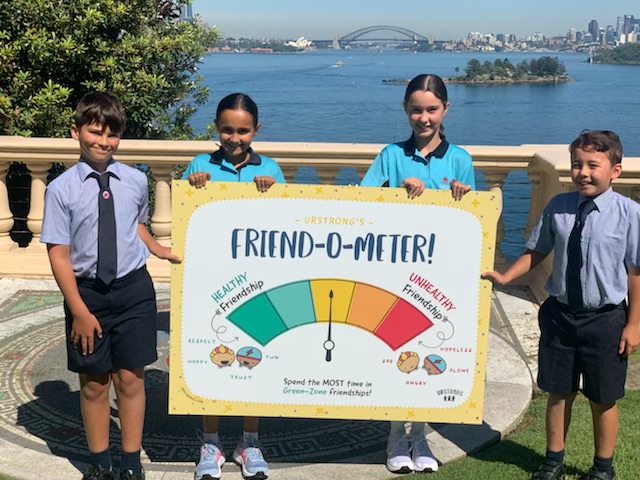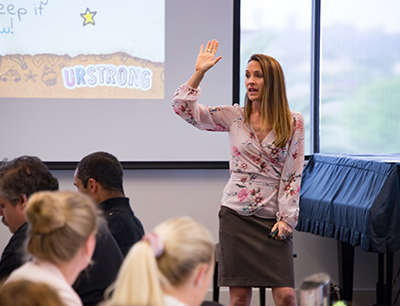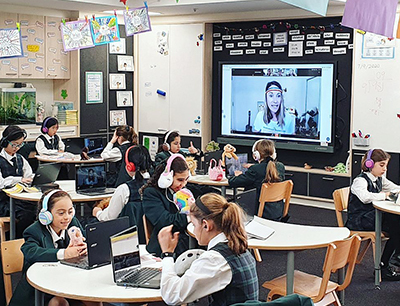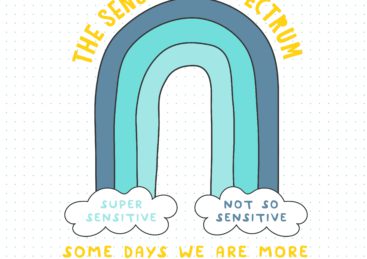St Andrew’s School in Walkerville, South Australia were recently featured in the news for their launch of our whole-school friendship strategy.

Tyson Greenwood, Director of URSTRONG Schools, worked closely with their Head of Wellbeing, Donna Longden, to train their teachers on the implementation of our school-wide friendship skills curriculum. We are so grateful for the support and leadership of their Principal, Luke Ritchie, who shared: “We gauge our success not only by strong academics, but also by the happiness of our students, as highlighted in The Advertiser today. We are excited for our inaugural URSTRONG Friendship Day later this month.”
As published in The Advertiser: Help for Anxious Kids
May 2024 – At St Andrew’s School, Walkerville, student wellbeing is being improved by program URStrong.
A third of primary school students and almost half of high schoolers have thought, or are planning to start, treatment for mental health concerns, worrying new survey results reveal.
Stress and anxiety are the most common reasons, followed by sadness and depression. A national survey of more than 2000 parents and carers of young people has also found ‘developing coping’ and ‘self help’ among the findings.
Experts say teenagers must resort to mental health support as “check-ins” and in dire or open cases must consult actual experts and health with students.
According to the latest School TV Wellbeing Barometer about 28 per cent of primary and 35 per cent of secondary students feel stressed or anxious frequently or constantly.
When children who sometimes experience those feelings are included the rates rise to above 80 per cent.
This is a strong driver of demand for mental health services, with 29 per cent of young children and 33 per cent of teenagers either in mental health treatment, awaiting an appointment or planning to consult a provider.
A further 8 per cent of primary pupils and 16 per cent of teenagers have tried treatment in the past.
“Without effective intervention and support, chronic stress and anxiety can have detrimental effects on students’ mental and physical health, as well as their academic performance,” the report authors say.
“Early intervention can make a profound difference in the lives of students who may be struggling with mental health issues.”
The report also found:
ALMOST 10 per cent of primary and 18 per cent of secondary students felt sad or depressed constantly or frequently.
THREE in 10 young children and teens had experienced some form of bullying more than once.
TWO in 10 adolescents had displayed “school refusal behaviours” more than once.
ONE in 7 adolescents reported self-harming, with the report said was “an alarming and deeply concerning finding”.
The report’s authors make recommendations including:
ENSURING trained counsellors are available on campus to provide immediate support to students in crisis.
CLEARLY defining the issues to take in a student in “immediate distress”.
CREATING a private and safe space for students to discuss concerns.
Education Minister Blair Boyer said the “wellbeing of our students is something that minister, I feel very strongly about, and something as must have as much importance as academic learning”. The SA government has committed $50m to placing wellbeing workers in 65 schools.
At St Andrew’s School in Walkerville, leaders are tackling wellbeing head-on with a new program designed to equip students with emotional skills to navigate relationship issues and feel a sense of belonging. Student wellbeing is being improved by the program URStrong, launched at the school this year, which teaches children friendship skills.
URStrong encourages children to stand up for themselves and identify if conflict between friends is “mean on purpose” or a blip in the friendship.
The director of wellbeing at St Andrew’s School, Donna Longden, said the program has made “a massive difference”.
Written by: Lauren Novak, Shashi Balutitis (The Advertiser)








